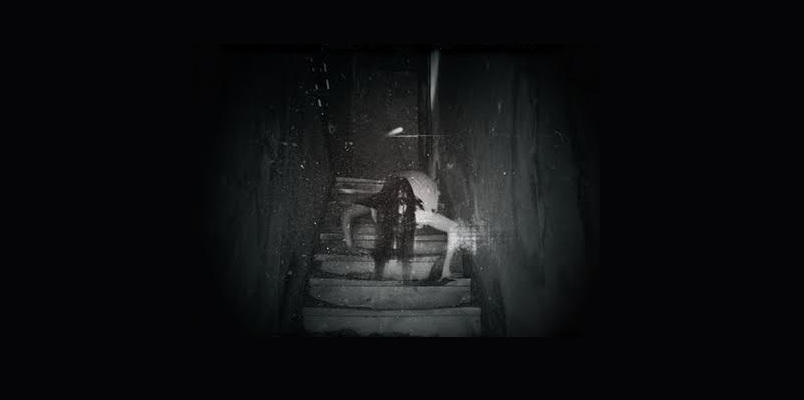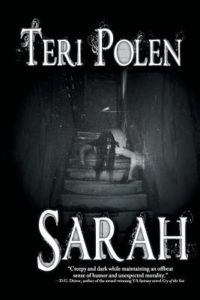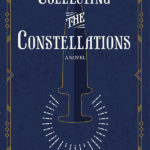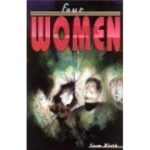
Sarah
Writer: Teri Polen
Publisher: Black Rose Writing
Genre: Young Adult Horror
A review by Amelia Wellman
 There’s nothing that piques my interest more than the promise of a good ghost story (I’ve said as much in at least half a dozen other reviews) and Sarah promised a sweet and simple young adult story of a ghost getting some good old fashioned revenge. Even the cover demanded my attention with a freaky girl crawling head first down a set of stairs. It just screamed Ju-On, one of my favourite ghost stories ever. How could I resist?
There’s nothing that piques my interest more than the promise of a good ghost story (I’ve said as much in at least half a dozen other reviews) and Sarah promised a sweet and simple young adult story of a ghost getting some good old fashioned revenge. Even the cover demanded my attention with a freaky girl crawling head first down a set of stairs. It just screamed Ju-On, one of my favourite ghost stories ever. How could I resist?
Delving past an intriguing cover though, and Sarah quickly breaks the promise that it made.
When Cain discovers the ghost of a girl from his high school haunting his attic, he agrees to help her seek justice against those responsible for her death. But when he discovers Sarah has been taking his body to get revenge and not justice, he’s terrified of what could happen when he’s not in control of himself. Each bloody act of revenge makes Sarah stronger and her sights are no longer on her enemies alone. Is there a way to stop her? Cain thought helping a ghost find her killers would be the supernatural adventure of a lifetime, now he just hopes to survive long enough to protect his family and friends from her.
The most glaring issue I had with Sarah was the characters. Sarah is a young adult book. I wish I didn’t have to use that as a derogatory statement because I really do enjoy some good YA, but the problem with YA like Sarah is that the author is not a young adult themselves and the whole tone of the book comes off as pandering and patronising to the reader rather than relatable. Polen’s main character Cain, along with his best friend Finn and girlfriend Lindsey, are some of the flattest, laziest caricatures of teenagers I’ve ever read.
And yes, a lot of mainstream YA can come off like that, and it does so more often than not (look at the lifeless husks in Twilight), but it’s so startlingly obvious in Sarah because of how Polen presents herself as an author. If you visit Polen’s Goodreads author page, you can read a reply to a question that was asked to her about if it was difficult to get into the mindset of a teenage boy. Polen replies by saying she “feels more like a teenage boy in her mindscape”. This confidence makes it even sadder how her teenage boy characters are so remarkably shallow. Anyone can assume that all teenage boys think about are video games and getting into a pretty girls’ pants, but when there’s nothing below those superficial longings, you’re not in their mindscape and feeling the things they do, you’re just throwing more boring, overused tropes into a pile and claiming its a fleshed out character.
Now, I’m not saying it’s impossible for a middle aged woman to write a good teenage boy character, I’m saying that just because Polen claims to not be like the other girls (which also raises the questions of what’s wrong with the other girls?) because she doesn’t like chick-flicks, she’s not thinking like a teenage boy. Believe it or not, there’s more to them than that; just like there’s more to teenage girl characters than the start of their periods and scoring a good prom date. Teenage characters shouldn’t be pigeon-holed because YA authors have outgrown their empathy for high schoolers and need to fall back on tired stereotypes to give their characters something to do.
Cain and his best friend Finn are the characters we see the most throughout Sarah. They’re both seventeen year old soccer stars on their high school team, videogame players, and horror movie lovers. Finn always wears t-shirts with something crass written on them and Cain has a terribly messy room. If you want more, I’m afraid there’s not much. Cain stays pretty personality-less throughout the whole thing, I guess to keep him as a safe neutral analogue for the reader. Finn however, gets worse and worse as the story goes on.
Finn is your usual teenage boy character, a guy that’s physically grown with the driver’s licence to prove it, but mentally staled at the ‘Fight Club is the greatest thing ever’ stage of his life. Combine that with the line “… as likely as Finn becoming politically correct overnight…” and he goes from uninspired teen boy to just plain problematic. While never explored in the narrative, I’m left wondering how far does his political incorrectness go? And the fact that Polen set this story in a Southern state gives this already unsavoury characteristic of not caring how those around him feel a more race-based connotation. No doubt unintended but something that should have been considered more than what dirty gag is going on his next t-shirt.
The female characters don’t get off much better. Cain’s first girlfriend Erin is using him for high school social ladder climbing and is the feminine = bad teenage girl archetype. Lindsey starts as Cain’s friend and then becomes his girlfriend and she’s better because she likes the Broncos and horror movies. I take a firm stance that girls can like whatever they want because gendered stuff is nonsense, and this whole feminine girls = bitch, while sporty girls that like ‘guy stuff’ = the only type of girl men end up liking trope has got to stop. It’s so hackneyed and definitely a sign of internalized misogyny if you can’t empathize with your own gender long enough to realize they are their own characters and not just plot points for male characters.
But it’s not just the characters that are hackneyed. The whole high school experience feels lazy. I mean, the food in the cafeteria is terrible? The most popular girl is a slutty bitch? The football players are big, dumb date-rapists? I’ve never heard any of those ones before.
Beyond the tropes pulled from other media, a lot of other properties in general are mentioned throughout the story. Paranormal Activity gets mentioned side by side with The Amityville Horror and Poltergeist. Then there’s Finn’s t-shirt with a reference to Fight Club and the proceeding obligatory moment of someone saying it’s an awesome movie but the book was better. Which, let me digress and point out, is wrong because Fight Club was one of the rare cases where the movie was better. Even the author of Fight Club agrees with that.
Then there’s Supernatural. You know, that CW show that should have ended about seven seasons ago? It’s mentioned quite a few times and yet Cain and Finn don’t think to salt and burn the bones of Sarah’s body to get rid of her ghost before they’re told that by a spiritualist? That’s not even to mention that salting and burning bones is a product of Supernatural, so it’s being name dropped and then ripped off all in one go!
Honestly, the worst thing about all the references is how dated they make the narrative feel. A classic ghost story works literally forever if you avoid directly talking about the world outside of the spooky happenings. Especially when it comes to popular brands of the day. If someone tries to read Sarah in fifty years, Paranormal Activity, Supernatural, and the PS4 game Destiny will be nothing but niche media of the past. They won’t add to the story, they’ll just be relics of a dying generation that were used to frame parts of the story where atmospheric tension should have been built up instead!
Not that tension could have been built anywhere in the story because Polen employed the worst device known to horror: having the main character aware of standard horror tropes. Aside from my own personal preferences regarding “meta”, it presents problems. The biggest being why would Cain do things like check a creepy, dark attic if he knows what’s going to happen next? Horror is about characters doing things that we know are bad for them, but they don’t. So this “meta” aspect of Cain knowing what’s coming takes you, the reader, out of the story because the character himself isn’t even in the story!
Of course any plot device can work when framed in an appropriate atmosphere. God is in the details, meaning whatever one does should be done thoroughly because details are good. Sarah misses the mark by not having enough details. Where are the descriptions that relay how terrifying a noise in a dark room is? Or the dread of walking into a house where something just isn’t right? Details are important, especially in horror where so much is carried by mood and tone.
While describing the ghost, Polen offers up descriptions along the lines of “… faster than any living thing I’d ever seen…” or “… movements of her body were completely inhuman.” Yes, but how are these movements quick? I doubt this ghost is faster than a fighter jet going Mach 1. Is she blinking to a different location every time the character blinks? And how are her movements completely inhuman? I’ve seen humans twist themselves into some pretty interesting shapes without having to kill themselves and come back as a ghost. Saying that something is inhuman doesn’t exactly cover it.
That brings us to the ghost herself. Sarah. She has a similar story to that of Kayako from Ju-On (a ghost lurking in the attic who doesn’t want justice, she just wants senseless violence against everyone and anyone while she scuttles around like a demonic crab). I’m a sucker for Ju-On. And I think Polen is too and tries to emulate the lurking horror that is Kayako. The problem? Kayako is silent, using her ghostly body in subtle, yet terrifying ways. Sarah on the other hand is an annoying loud mouth. Sarah talks in full, coherent sentences, knows she’s dead and who killed her, and never does anything without including a super-villain exposition dump rant.
Though the worst part has got to be every time Cain does something to hurt her (like cleansing the house or burning her bones) Sarah will literally ask what he’s doing. Just over and over again with “what have you done?” or “what are you doing to me?”. For a ghost that seemed to have all her shit together, it’s amazing to me she has to ask so many questions of the people she’s haunting. Seriously, ghosts should be seen but very rarely heard. I don’t need them to lay out their plans like a Bond villain. I don’t need them to throw a bitch fit every time something doesn’t go their way. It takes the excitement of the unknown away, and without that, what is the point of a scary story?
The Verdict
Skip it. The story told in Sarah attempts to create its own voice by riding on the coattails of other ghost-centred narratives. Unfortunately this mix and match of classic tropes doesn’t create something new, it creates a muddled mess of confusing decisions, stereotypical characters, and lackluster payoffs. The voice and tone are incoherent, which means it misses the mark when appealing to its target audience, and instead comes off as pandering with the ham-fisted cultural references that have, of course, already dated it. Put away your Ouija boards. Sarah is a ghost story better left alone.



